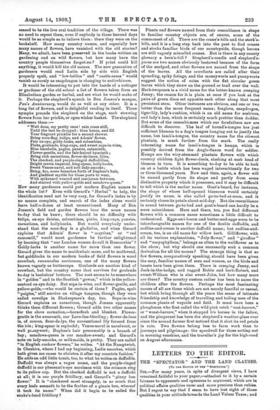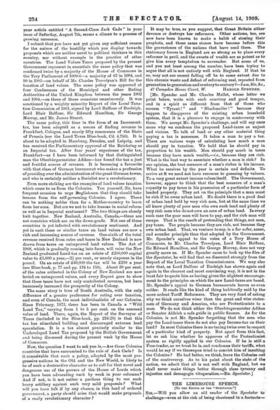LETTERS TO THE EDITOR.
THE "SPECTATOR" AND THE LAND CLAUSES. !To T1111 EDITOR OF TRII " EPRCTATOR.".1 Si,—For many years, in spite of divergent views, I have remained faithful to your paper,—attached to it by a certain fairness to opponents and openness to argument, which are in political affairs qualities rarer and more precious than rubies. But I regret to say that I seem to have lost sight of those qualities in your attitude towards the Land Values Taxes ; and
your article entitled "A Second-Class Jack Cade" in your issue of Saturday, August 7th, seems a climax to a process of growing unreason.
I submit that you have not yet given any sufficient reason for the nature of the hostility which you display towards proposals which are neither novel to political thinkers in this country, nor without example in the practice of other countries. The Land Values Taxes proposed by the present Government represent in essentials the same policy that was confirmed twice by a majority of the House of Commons in the Tory Parliament of 1900-6—a majority of 67 in 1904, and 90 in 1905—on behalf of Mr. Charles Trevelyan's Bill for the taxation of land values. The same policy was approved at four Conferences of the Municipal and other Rating Authorities of the United Kingdom between the years 1902 and 1904,—on three of those occasions unanimously. It was sanctioned by a weighty minority Report of the Local Taxa- tion Commission of 1901, signed by Lord Balfour of Burleigh, Lord Blair Balfour, Sir Edward Hamilton, Sir George Murray, and Mr. James Stuart.
The same policy, this time in the form of an Increment- tax, has been adopted as a means of finding revenue in Frankfurt, Cologne, and nearly fifty communes of the State of Prussia (see the Land Taxes Blue-book, Cd. 4,750). It is about to be adopted in Hamburg, Dresden, and Leipzig, and has received the Parliamentary approval of the Reichstag as an Imperial tax. After four years' experience of the tax, Frankfurt—as I have been informed by that distinguished man the Oberbiirgermeister Adikes—bas found the tax a just and fruitful source of revenue. It is becoming a favourite with that class of German bureaucrat who makes a profession of presiding over the administration of the great German towns, and who is certainly neither a Socialist nor a revolutionary.
Even more striking are the examples of land values taxation which come to us from the Colonies. You yourself, Sir, have frequent occasion to urge Englishmen that they should take lessons from the self-governing Colonies. I agree. There can be nothing nobler than for a Mother-country to learn from her sons. But are we not to take lessons in social reform as well as in Imperial sentiment ? The two things are closely knit together. New Zealand, Australia, Canada,—these are not countries which are on the down-grade. Not one of these countries is yet infected with revolutionary sentiment. And yet in each these or similar taxes on land values are now a rich and increasing source of revenue. One-sixth of the total revenue received from rates and taxes in New Zealand is now drawn from taxes on unimproved land values. The Act of 1908, which is gradually coming into force, will raise the New Zealand graduated Land-tax on an estate of 2200,000 capital value to 25,000 a year,-2i per cent., or nearly sixpence in the pound. On an estate of 240,000 the tax will be 2200 a year (see Blue-book, p. 77 and pp. 134 to 156). About 30 per cent. of the rates collected in the Colony of New Zealand are now levied on unimproved values, and every Report goes to show that these taxes have not only contributed revenue, but have immensely increased the prosperity of the Colony.
The same story is true of South Australia, with the only difference of a greater preference for rating over taxation, and even of Canada, the most individualistic of our Colonies. Since February, 1873, there has been in Canada a "Wild Land Tax," varying from 1 to 5 per cent. on the assessed value of land. There, again, the Report of the Surveyor of Taxes (included in the Blue-book, pp. 216-20) is that this tax has stimulated building and discouraged extreme land speculation. It is a tax almost precisely similar to the Undeveloped Land Tax proposed by the British Government and being discussed during the present week by the House of Commons.
Now, the question I want to ask you is,—Are these Colonies countries that have succumbed to the rule of Jack Cade? Is it conceivable that such a policy, adopted by the most pro- gressive nations in the Old and the New World, is likely to be of such a destructive character as to call for that novel and dangerous use of the powers of the House of Lords which you have been advocating week by week in your columns?
And if not, is it not rather a perilous thing to use such heavy artillery against such very mild proposals ? What will you have left if by any chance, in this land of ordered government, a party should arise that would make proposals of a really revolutionary character ?
It may be true, as you suggest, that Great Britain either devours or destroys her reformers. Other nations, too, ere now have been known to make a habit of stoning their' prophets, and those same stones have become before this the gravestones of the nations that have used them. The stationary forces in England are so strong as to Rim* every reformer in peril, and the sweets of wealth are so potent as to' give him every temptation to surrender. But some of us, and you not least among the number, have been trying to argue that all is not entirely well with England. If that be so, may not our recent falling off be to some extent due to this chronic waste and defeat of reforming zeal, repeated from generation to generation and century to century P—I am, Sir, &c., 47 Cam pden House Court, W. HAROLD SPENDER.
[Mr. Spender and Mr. Charles Mallet, whose letter we print below, write with such courtesy and good temper, and in a spirit so different from that of those who scream " Tyrant ! " and " Blackmailer !" because they happen to disapprove of the existing urban leasehold system, that it is a pleasure to engage in controversy with them. We accept Mr. Spender's challenge, and will say once more why we condemn the proposed Land-taxes as unjust and vicious. To talk of land or any other material thing paying a tax is nonsense. It takes a man to pay a tax. There are various ways of calculating how much a man should pay in taxation. We hold that he should pay in proportion to his wealth. Men should pay much in taxes because they have much wealth,—i.e., because they are rich. What is the best way to ascertain whether a man is rich ? In our opinion, the best measure of a man's riches is his income. What he receives by the year is certain and definite. To arrive at it we need not have recourse to guessing by valuers. To a very great extent income values itself. The Government, however, appear to think that the beat measure of a man's capacity to pay taxes is his possession of a particular form of landed property. They act on the principle that a man must be rich if he owns urban land. No doubt there is a good deal of urban land held by very rich men, but at the same time we all know plenty of poor men who own such land and plenty of very rich men who do not own an acre of urban land. In every' such ease the poor man will have to pay, and the rich man will escape. That is the result of pretending that things, not men, pay taxes. Tax people because they are rich, not because they own urban land. That, we venture to say, is a far safer, saner, and sounder principle than that adopted by the Government. Mr. Spender's appeal to the votes of a Tory House of Commons, to Mr. Charles Trevelyan, Lord Blair Balfour, Sir Edward Hamilton, and Sir George Murray, does not very greatly move us. If Mr. Spender cares to look up the files of the Spectator, he will find that we dissented strongly from the Report of the Local Taxation Commissioners. We may also note that, as Lord Balfour of Burleigh has shown again and again in the clearest and most convincing way, it is not in the least fair to quote him as having given the slightest encourage- ment to the principles on which the new Land-taxes are based. Mr. Spender's appeal to German bureaucrats leaves us even colder. It reads like the kind of thing habitually said by the- more ardent Tariff Reformers. They are very fond of asking why we think ourselves wiser than the great and wise states- men of Germany and America, who are Protectionists to a man. We do not think either the Oberbilrgermeister Adikes or Senator Aldrich a safe guide in public finance. As for the Colonies, is not Mr. Spender forgetting that the men who pay the Land-taxes there do not also pay Income-tax on their land? In most Colonies there is no taxing twice over in respect of a particular kind of property. But apart from this fact, let us ask him whether be approves of the Protectionist' system so rigidly applied in our Colonies. If be is still a Free-trader, as we trust he is, and condemns their tariffs, what would he say if we thereupon tried to convict him of insulting the Colonies He bad better, we think, leave the Colonies out of the controversy. As to his point about the state of the nation, we admit that all is not well with England, but we shall never make things better through class tyranny and injustice and demagogic vituperation.—En. Spectator.]







































 Previous page
Previous page